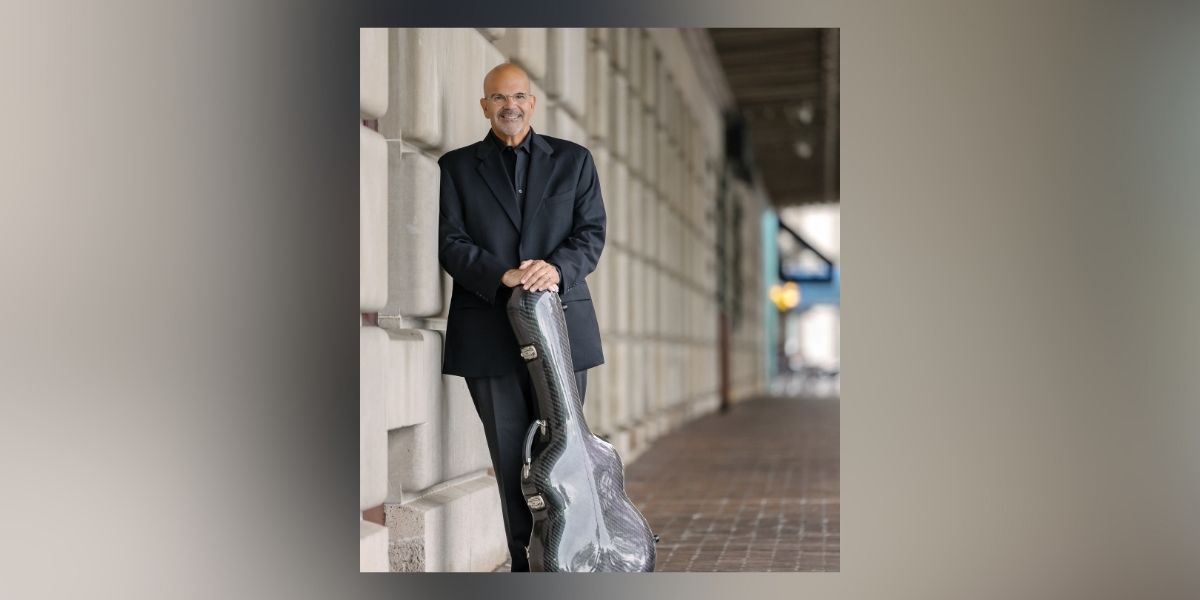By Jonathan Heath
The modern guitar’s roots run so deep they can be tracked back to 15th-century Spain. Other plucked instruments, like the lute, date back even further. Yet despite its storied history, many famous classical composers—including Beethoven and Bach—never wrote for guitar. Today, it’s most often associated with rock stars and singer-songwriters.
Nicholas Goluses, Eastman School of Music’s Professor of Guitar, knows this legacy well and has spent his career redefining the guitar’s possibilities. But Goluses would be the first to admit he got off to a slow start. Growing up in Rhode Island, his household wasn’t particularly musical. Still, like many young boys, he was drawn to the guitar. In sixth grade, he played electric guitar and formed a rock band with school friends, which he remembers as being “very popular.”
An evening in front of the TV, however, changed everything. While watching reruns of The Ed Sullivan Show with his father, Goluses saw the great Spanish virtuoso, Andrés Segovia. On their small black-and-white screen, Segovia—looking as old and intense as ever—played on a darkened stage, a spotlight capturing every precise movement of his fingers as they danced up and down the fretboard. Goluses was mesmerized.
“For no particular reason, I thought it was the most beautiful thing I had ever heard,” he recalls. “And I asked my father, ‘Dad, what’s this?’ And he replied, ‘Well, son, that’s a real musician.’”
And that was that. “The gauntlet had been thrown, and I knew that’s what I wanted,” Goluses says.
With no classical instructors nearby, he began to teach himself until he found mentors in Boston. He moved to New York City to continue his training when he was 19. Years later, he would recount this story to the maestro himself—only to learn that Segovia had not enjoyed his time on The Ed Sullivan Show, annoyed that a producer had lit the “applause” sign too early.
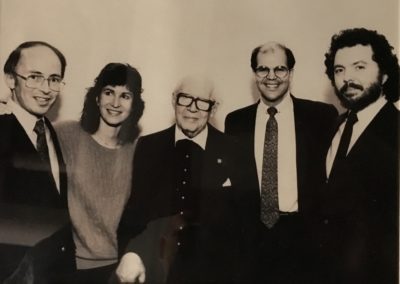
From left to right: classical guitarists Carlos Barbosa-Lima, Sharon Isbin, Andrés Segovia, Nicholas Goluses, and Manuel Barrueco.
Before joining the faculty at Eastman, Goluses held the Andrés Segovia Faculty Chair at Manhattan School of Music (where he received his Doctor of Musical Arts degree) and hosted Segovia for what would be the Spaniard’s final master classes.
“Segovia was the larger-than-life guitarist of our time, and, fortunately, I got to share in a little bit of that at the end of his life,” Goluses says, bringing his story with Segovia full circle.
Goluses has now been at Eastman for over 30 years. “It has been the honor of my professional life to train young artists and watch them thrive here,” he says.
In the classroom, Goluses emphasizes three key elements: smoothness of playing, control, and quality of sound.
“A perfect technique is always smooth, even if the music is violent. The second thing I stress is control. Control is all mental. You must give your hands good information because there’s no brains in the tips of the fingers. It all comes from here,” he says, tapping his head.
“And then, of course, it’s not only how you play, but also what you play. Quality of sound. I think it’s important to be creative and program imaginatively.”
Goluses and his students have no trouble with creativity. “I think as guitarists, we’re all basically rabble-rousers. There’s a sense of non-tradition that guitarists embrace. And I have no trouble trying to get my students to think for themselves.”
A BIRTHDAY CELEBRATION
On April 16, Goluses returns to Hatch Recital Hall for a Faculty Artist Series concert like no other—a special 70th birthday party where he’ll be joined by friends and colleagues for a truly unique performance.
Hatch Hall holds special meaning for Goluses. He was the first to perform there when it opened in 2010 and says it’s the best guitar hall he’s ever played in. “I would be the first person to say if it wasn’t, but it’s a very, very special hall from my point of view.”
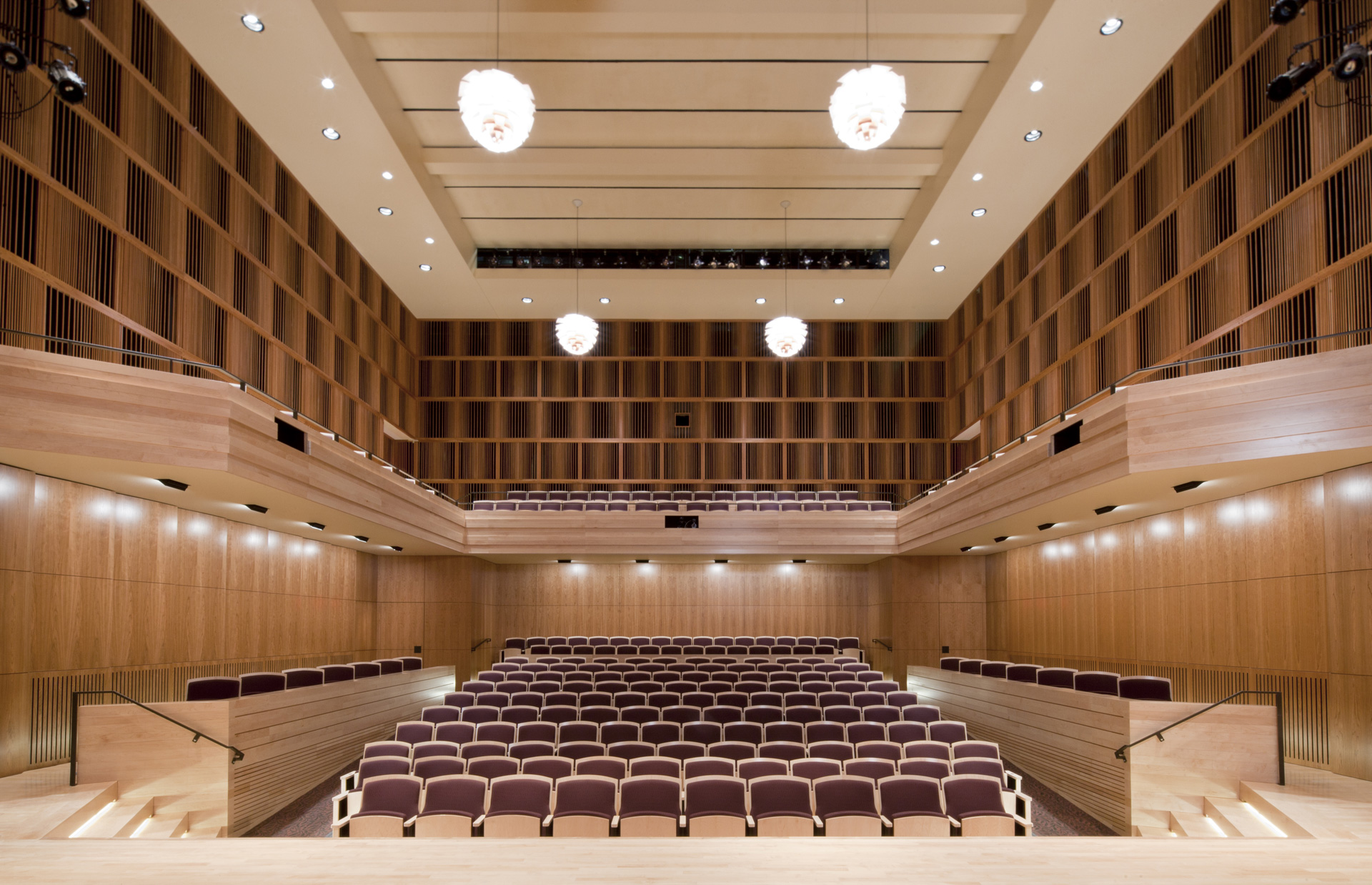
View of Hatch Recital Hall from the stage into the audience.
For this concert, it’s clear that Goluses wants to have fun with the program—and why not? Normally, as a classical guitarist he plays solo: seated alone with the stage to himself and the audience hushed to catch each pluck of a string. But this is a party, a celebration of getting older while feeling young, and for that, you need friends. Fitting, then, that he’s kicking off proceedings by inviting as many guitarists on stage as possible.
Steve Reich’s Electric Counterpoint is a 15-minute masterpiece in three movements that has earned a cult following since its release in the late 80s. Written for 13 classical guitars, two electric guitars, and two electric bases, Goluses has invited an eclectic mix of faculty and staff (including Bob Sneider, Associate Professor of Jazz Studies & Contemporary Media and Senior Instructor of Jazz Guitar at Eastman Community Music School (ECMS), Matthew Ardizzone ’97E, Associate Dean of Graduate Studies, Petar Kodzas ’99E, Associate Dean of ECMS, Jeff Campbell ’92E MM, Professor of Jazz Studies & Contemporary Media, and Lynn McGrath, Professor of Guitar at ECMS), alongside current doctoral students, former students, and undergraduates as well.
“It’s going to be tight, but we’ll fit,” Goluses says with a grin.
After that rousing start, Goluses will slow things down by reuniting with Eastman Professor of Flute Bonita Boyd. Together they’ll play Astor Piazzolla’s Histoire du Tango. Boyd has been a close friend for many years, collaborating on numerous albums, concerts, and tours, including an extensive expedition across China in 2017.
“Bonnie was on my very first faculty concert at Eastman. She was the first person I looked up when I came here from New York. The flute and guitar repertoire is really quite spectacular, and I wanted to work with her. She’s my favorite flutist, and we’ve played together ever since.”
With no planned intermission, the concert continues right along. Next up, Goluses partners with the great tenor (and his long-time sailing buddy) Robert Swensen, Professor of Voice, for three songs by the Spanish composer Joaquín Rodrigo.
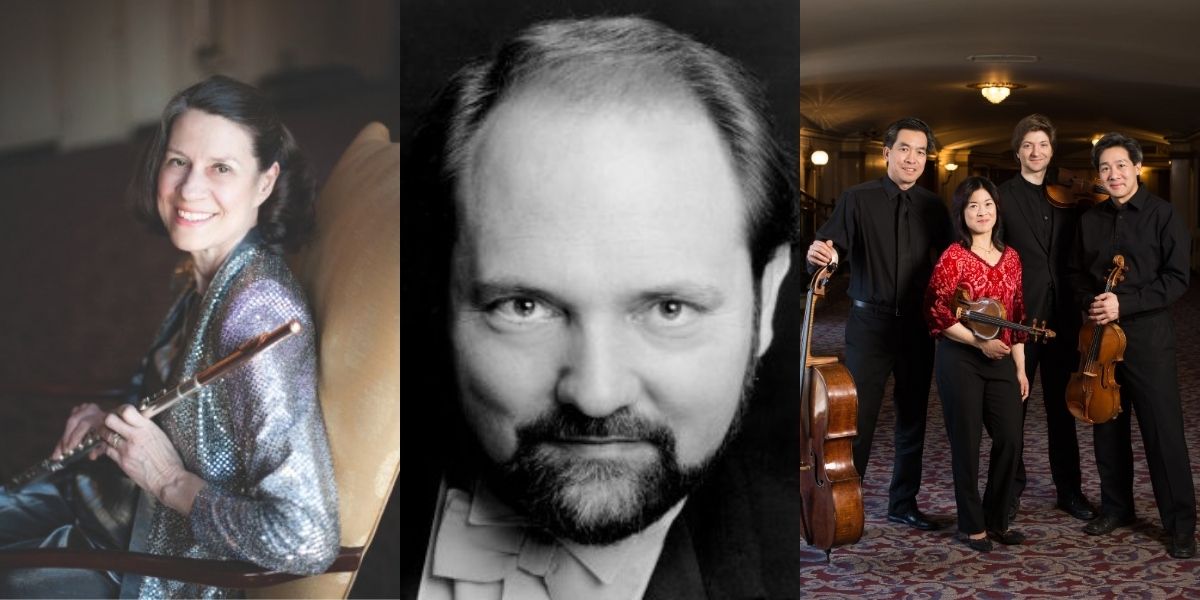
Goluses will be joined on stage by (from left to right) Bonita Boyd, Robert Swensen, and the Ying Quartet.
For the finale, Goluses will be joined by Eastman’s quartet-in-residence, the Ying Quartet, for Luigi Boccherini’s Fandango for quintet (guitar and quartet). “Being a cellist, Boccherini wrote a cello part that is quite extensive, so David Ying will have his hands full,” Goluses chuckles. “There’s even a part where Boccherini has the cellist put down his cello and play castanets. I had to see that!”
LOOKING AHEAD
His 70th milestone may have snuck up on him, but Goluses certainly doesn’t feel his age. When he thinks about what comes now, the next decade and beyond, he feels, if anything, young again.
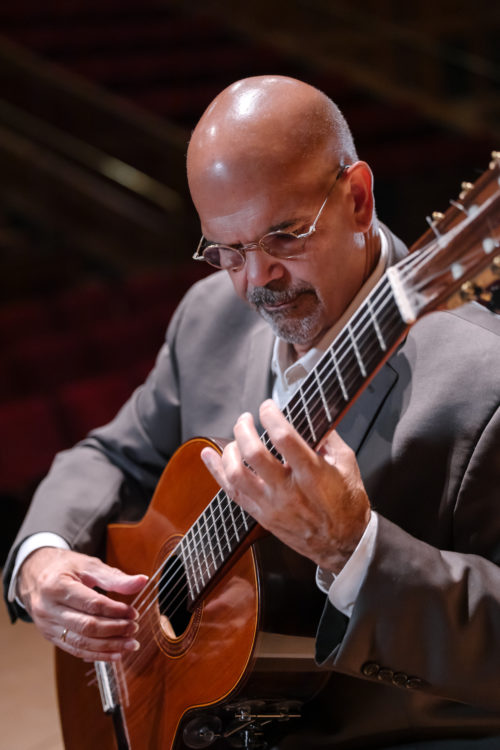
Nicholas Goluses.
With a new decade ahead also comes a new album. Slated for release in June 2025, Across the Horizon is a collection of mostly solo works from 20th- and 21st-century composers from Argentina, Australia, America and beyond. But one highlight features Goluses with the Eastman Wind Ensemble performing the spectacular piece ‘A Concerto of Colors’ by English composer Stephen Goss.
Across the Horizon may take its name from an unexpected collaboration … with NASA. Goluses never fancied himself an astronaut, but if the opportunity arose to view Earth from 250 miles up, he wouldn’t say no. “NASA called me and said they wanted me to play Bach for footage taken at the International Space Station as it circumnavigates the globe,” Goluses says excitedly. “So, I jested, ‘Can I go up? Can I play my guitar in space?’ But they just wanted me to send them the recording. I still like to think that, metaphorically speaking, I’ve been to space. The videos are elegant.”
For now, though, Goluses is keeping his feet firmly on the ground. The hallmark of Eastman is to make beautiful music and that’s what he’ll continue to do, alone or with friends, in the classroom or on the world’s stage.
“I’m still trying to learn and still trying to adapt, and I can’t imagine a day when that doesn’t happen. Having ‘looked at life from both sides now,’ I appreciate the gift of music more than ever. And for now, my hands feel good, my health is good, and I’ve still got my marbles. So, I’m going to keep going. I love it too much.”
For a full biography of Nicholas Goluses, please visit our website.
Faculty Artist Series: Nicholas Goluses & Friends
A 70th Birthday Concert
Wednesday, April 16, 2025
7:30 p.m. | Hatch Recital Hall
